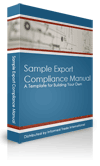ITAR Marketing and Pre-sale Activity Regulation
Exportation of defense articles and related technical data is key to the furtherance of various national security and diplomatic objectives, and as such, the United States allows exporters to sell, transfer, and otherwise protected defense articles (subject to regulatory controls) to foreign purchasers.
The International Traffic in Arms Regulations (ITAR) — administered by the Directorate of Defense Trade Controls (DDTC) of the State Department — regulate the exportation of certain qualifying defense articles and related technical data. ITAR implements a range of regulatory controls, requiring arms exporters, brokers, and other relevant parties to register with the DDTC and obtain licenses, or to qualify for a licensing exemption.
The sale of defense articles and related technical data often demands — like the sale of most other functionality-focused goods — significant marketing and pre-sale activities. For example, if you are attempting to negotiate the sale of a motorized gun-mount, it will almost certainly help to be able to distribute documents describing the performance, and detailing the design and operation of the gun-mount in real-world situations. To do so, you will have to satisfy certain ITAR requirements, as ITAR regulations not only cover the exportation of defense articles and technical data, but also cover the distribution of marketing information relating to the aforementioned defense articles and technical data.
Pursuant to the ITAR, you will either have to obtain a marketing license or meet an exemption allowing you to distributing marketing information and conduct pre-sale activities. If you fail to obtain a license or meet an exemption, then civil and criminal penalties could be imposed.
Let’s take a quick look at how marketing and pre-sale activity regulation is regulated.
Marketing License Not Required
Not all marketing information requires a license from the DDTC in order to share it with foreign persons/entities. More specifically, any marketing information that is publicly available (or in the public domain) does not require approval from the DDTC.
What constitutes publicly available information? There are no set-in-stone definitions for publicly available information under ITAR, but generally speaking, any information that describes the basics of a product (i.e., its form and function), or that would be presented in standard marketing materials on the company website, or at a convention or trade show, qualifies as publicly available information.
As a rule: information that could be revealed to an industry competitor without any issue (in the sense that the information is not in-depth enough to represent a significant disclosure of intellectual property) is likely to be considered publicly available information that does not need a license or the approval of the DDTC.
Keep in mind that any information that is generally accessible to the public falls into the public domain and is therefore also exempt from licensing/approval requirements for sharing. For example, information available in a patent could be shared with a foreign person or entity. Information about a particular defense article or technical data that has been revealed in a newspaper, for example, could also be shared, as such information is accessible by the public at-large.
Marketing License is Required
The disclosure of non-public information (for marketing and pre-sale activities) concerning a covered defense article or technical data will require a license. There are two ITAR marketing licenses in particular that you are most likely to encounter: 1) the DSP-5 license, and 2) the DSP-73 license. Let’s take a peek.
DSP-5 Licensing
The DSP-5 license allows for the permanent export of controlled information regarding unclassified defense articles and technical data to certain identified foreign parties. The DSP-5 can be split further into a general marketing license and a specific marketing license.
The general marketing license gives you the ability to market the covered products and services to foreign parties (i.e., by giving a presentation), but those parties must be identified beforehand. You cannot disclose controlled information to foreign parties who were not identified in the application for the license. Further, you will have to identify the specific information that you intend to disclose. You cannot disclose more than what you initially intended.
The specific marketing license allows for more in-depth marketing and disclosure of more detailed technical data. For example, a DSP-5 specific marketing license would allow you to give an analytical presentation about the software system and data model that powers a motorized gun-mount product. As with a general marketing license, you will have to identify the information that you intend to share with the foreign parties at-issue.
DSP-73 Licensing
The DSP-73 license is a sort of temporary export alternative to the DSP-5 license that works well for demonstrations and the like. A DSP-73 license entitles you to take a product abroad, present it, and conduct a demonstration for numerous parties. The license is quite powerful, as it enables you to perform a demonstrate in a public setting (i.e., at a trade show or convention). It’s important to note, however, that if you intend to disclose technical information that might qualify as “non-public,” then you will likely have to obtain a DSP-5 license in addition to a DSP-73 license.
It can be difficult to effectively market an ITAR-covered product or service while contending with various regulations that restrict such marketing. Fortunately, however, the DDTC licensing and approval process is fairly straightforward. If the information disclosure qualifies for an exemption, you won’t need a license. If the information disclosure does require a license, you’ll have to determine whether to apply for a DSP-5, a DSP-73, or both.
Good luck!
Posted on March 7th, 2017 by admin
Filed under: ITAR | Comments Off on ITAR Marketing and Pre-sale Activity Regulation


